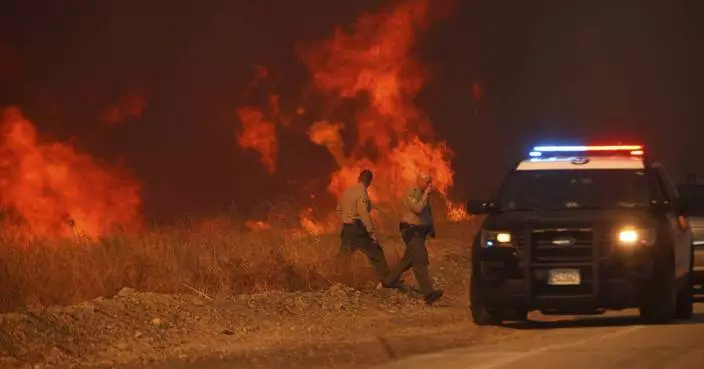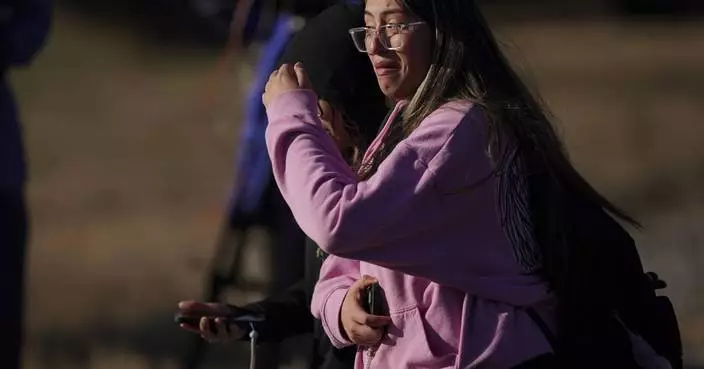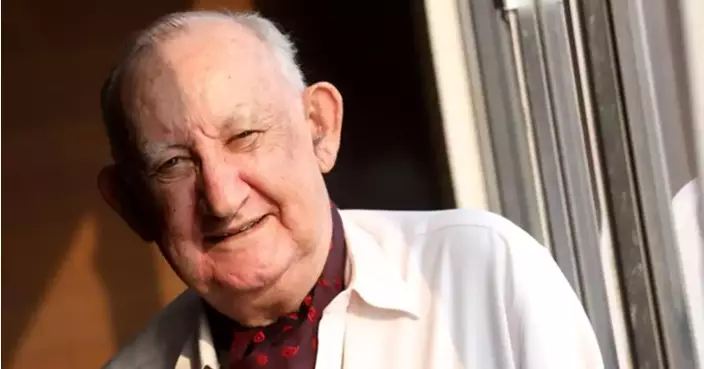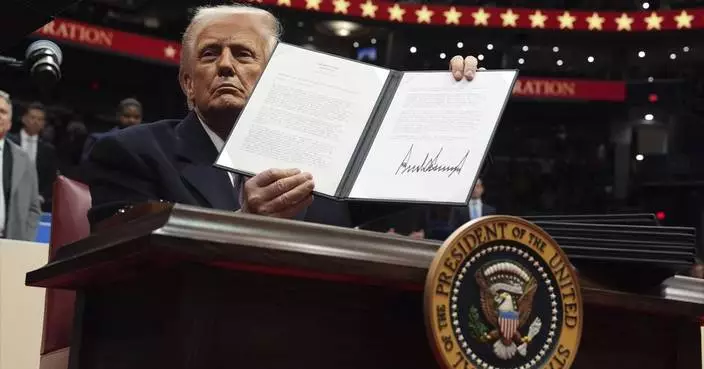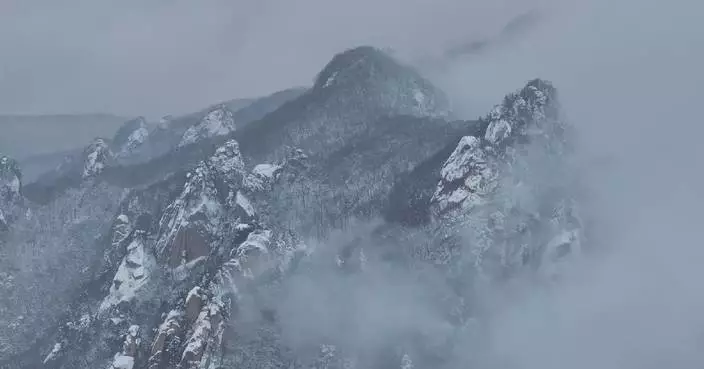YEKATERINBURG, Russia (AP) — U.S.-Russian dual national Ksenia Khavana was convicted Thursday of treason in a Russian court and sentenced to 12 years in prison on charges stemming from a donation of about $52 to a charity aiding Ukraine.
Khavana, identified by Russian authorities by her maiden name of Ksenia Karelina, was arrested in the Ural Mountains city of Yekaterinburg in February and pleaded guilty in a closed trial last week, news reports said.
Click to Gallery
In this photo released by Meshchansky District Court press service on Wednesday, Aug. 14, 2024, U.S. citizen Joseph Tater stands in a courtroom facing criminal assault charges after allegedly attacking a police officer in a Moscow hotel. Moscow's Meshchansky District Court has just found him guilty of minor disorderly conduct and ordered him to spend 15 days in custody. (Meshchansky District Court Press Service via AP)
Ksenia Karelina, also known as Khavana sits in a glass cage in a courtroom in Yekaterinburg, Russia, Thursday, Aug. 15, 2024. A Russian court on Thursday sentenced U.S.-Russian dual national Ksenia Khavana to 12 years in prison on a treason conviction for allegedly raising money for the Ukrainian military. (AP Photo)
Ksenia Karelina, also known as Khavana sits in a glass cage in a court room in Yekaterinburg, Russia, Thursday, Aug. 15, 2024. A Russian court on Thursday sentenced U.S.-Russian dual national Ksenia Khavana to 12 years in prison on a treason conviction for allegedly raising money for the Ukrainian military. (AP Photo)
Ksenia Karelina, also known as Khavana speaks with her lawyer standing in a glass cage in a court room in Yekaterinburg, Russia, Thursday, Aug. 15, 2024. A Russian court on Thursday sentenced U.S.-Russian dual national Ksenia Khavana to 12 years in prison on a treason conviction for allegedly raising money for the Ukrainian military. (AP Photo)
FILE - Ksenia Karelina, also known by the last name of Khavana, sits in a defendant's cage in a court in Yekaterinburg, Russia, on Thursday, June 20, 2024. (AP Photo, File)
Ksenia Karelina, also known as Khavana sits in a glass cage in a court room in Yekaterinburg, Russia, Thursday, Aug. 15, 2024. A Russian court on Thursday sentenced U.S.-Russian dual national Ksenia Khavana to 12 years in prison on a treason conviction for allegedly raising money for the Ukrainian military. (AP Photo)
Khavana, a 33-year-old former ballet dancer, reportedly obtained U.S. citizenship after marrying an American and moving to Los Angeles. She had returned to Russia to visit her family.
She reportedly had her phone confiscated after arriving in Yekaterinburg in January and police found evidence on the phone of the donation. Soon before her planned departure, she was jailed for 15 days on petty hooliganism charges and then charged with treason.
Russia’s Federal Security Service said she “proactively collected money in the interests of one of the Ukrainian organizations, which was subsequently used to purchase tactical medical supplies, equipment, weapons, and ammunition for the Ukrainian armed forces.”
The rights group The First Department said the charges stem from a $51.80 donation to a U.S. charity. The trial took place in Yekaterinburg, about 880 miles (1,420 kilometers) east of Moscow.
White House national security spokesman John Kirby said that the conviction and sentencing of Khavana was “nothing less than vindictive cruelty.” He said U.S. officials were working to gain consular access to Khavana.
“We’re talking about 50 bucks,” Kirby added. “To call that treason is absolutely ludicrous”
Khavana's attorney, Mikhail Mushailov, said he planned to appeal the verdict.
“She admitted guilt in part in transferring the funds, but did not admit her intent to transfer the funds to the organizations where they were most likely received," he said.
"She did not assume that the funds she transferred would be used for anti-Russian actions,” he said, according to the Interfax news agency.
Since sending troops into Ukraine in February 2022, Russia has sharply cracked down on dissent and has passed laws that criminalize criticism of the operation in Ukraine and remarks considered to discredit the Russian military. Concern has risen since then that Russia is targeting U.S. nationals for arrest.
In a separate development on Thursday, Moscow’s Meshchansky District Court ordered a U.S. citizen identified as Joseph Tater to be held in custody for two months pending a probe on charges of attacking a police officer. A day before, the same court sentenced Tater to 15-day administrative arrest on “petty hooliganism” charges.
Russian state news agencies Tass and RIA-Novosti said that the American became abusive after being asked to show his documents at an upscale hotel on Monday evening. They claimed that the U.S. citizen "behaved aggressively” and used profanities when the hotel refused to accommodate him, citing a lack of required documents. The reports said that the man attacked a police officer when he was taken to a police precinct.
Officials at the U.S. Embassy in Moscow said they were aware of the reports, but wouldn’t make further comments because of privacy restrictions.
On Aug. 1, Russia and the West held the largest prisoner exchange since the end of the Cold War. Included in the swap was Wall Street Journal reporter Evan Gershkovich and American corporate security executive Paul Whelan, both of whom were convicted of espionage charges that they vehemently denied, and U.S.-Russian dual national Alsu Kurmasheva, a Radio Liberty/Radio Free Europe journalist sentenced to 6 1/2 years for spreading “false information” about the Russian military.
Russia also released several prominent opposition figures who were imprisoned for criticizing the military operation in Ukraine.

In this photo released by Meshchansky District Court press service on Wednesday, Aug. 14, 2024, U.S. citizen Joseph Tater stands in a courtroom facing criminal assault charges after allegedly attacking a police officer in a Moscow hotel. Moscow's Meshchansky District Court has just found him guilty of minor disorderly conduct and ordered him to spend 15 days in custody. (Meshchansky District Court Press Service via AP)

Ksenia Karelina, also known as Khavana sits in a glass cage in a courtroom in Yekaterinburg, Russia, Thursday, Aug. 15, 2024. A Russian court on Thursday sentenced U.S.-Russian dual national Ksenia Khavana to 12 years in prison on a treason conviction for allegedly raising money for the Ukrainian military. (AP Photo)

Ksenia Karelina, also known as Khavana sits in a glass cage in a court room in Yekaterinburg, Russia, Thursday, Aug. 15, 2024. A Russian court on Thursday sentenced U.S.-Russian dual national Ksenia Khavana to 12 years in prison on a treason conviction for allegedly raising money for the Ukrainian military. (AP Photo)

Ksenia Karelina, also known as Khavana speaks with her lawyer standing in a glass cage in a court room in Yekaterinburg, Russia, Thursday, Aug. 15, 2024. A Russian court on Thursday sentenced U.S.-Russian dual national Ksenia Khavana to 12 years in prison on a treason conviction for allegedly raising money for the Ukrainian military. (AP Photo)

FILE - Ksenia Karelina, also known by the last name of Khavana, sits in a defendant's cage in a court in Yekaterinburg, Russia, on Thursday, June 20, 2024. (AP Photo, File)

Ksenia Karelina, also known as Khavana sits in a glass cage in a court room in Yekaterinburg, Russia, Thursday, Aug. 15, 2024. A Russian court on Thursday sentenced U.S.-Russian dual national Ksenia Khavana to 12 years in prison on a treason conviction for allegedly raising money for the Ukrainian military. (AP Photo)
What's in a name change, after all?
The water bordered by the Southern United States, Mexico and Cuba will be critical to shipping lanes and vacationers whether it’s called the Gulf of Mexico, as it has been for four centuries, or the Gulf of America, as President Donald Trump ordered this week. North America’s highest mountain peak will still loom above Alaska whether it’s called Mt. Denali, as ordered by former President Barack Obama in 2015, or changed back to Mt. McKinley as Trump also decreed.
But Trump's territorial assertions, in line with his “America First” worldview, sparked a round of rethinking by mapmakers and teachers, snark on social media and sarcasm by at least one other world leader. And though Florida Gov. Ron DeSantis put the Trumpian “Gulf of America” on an official document and some other gulf-adjacent states were considering doing the same, it was not clear how many others would follow Trump's lead.
Mexican President Claudia Sheinbaum joked that if Trump went ahead with the renaming, her country would rename North America “Mexican America.” On Tuesday, she toned it down: “For us and for the entire world it will continue to be called the Gulf of Mexico.”
Map lines are inherently political. After all, they're representations of the places that are important to human beings — and those priorities can be delicate and contentious, even more so in a globalized world.
There’s no agreed-upon scheme to name boundaries and features across the Earth.
“Denali” is the mountain's preferred name for Alaska Natives, while “McKinley" is a tribute to President William McKinley, designated in the late 19th century by a gold prospector. China sees Taiwan as its own territory, and the countries surrounding what the United States calls the South China Sea have multiple names for the same body of water.
The Persian Gulf has been widely known by that name since the 16th century, although usage of “Gulf” and “Arabian Gulf” is dominant in many countries in the Middle East. The government of Iran — formerly Persia — threatened to sue Google in 2012 over the company’s decision not to label the body of water at all on its maps. Many Arab countries don’t recognize Israel and instead call it Palestine. And in many official releases, Israel calls the occupied West Bank by its biblical name, “Judea and Samaria.”
Americans and Mexicans diverge on what to call another key body of water, the river that forms the border between Texas and the Mexican states of Chihuahua, Coahuila, Nuevo Leon and Tamaulipas. Americans call it the Rio Grande; Mexicans call it the Rio Bravo.
Trump's executive order — titled “Restoring Names That Honor American Greatness” — concludes thusly: “It is in the national interest to promote the extraordinary heritage of our Nation and ensure future generations of American citizens celebrate the legacy of our American heroes. The naming of our national treasures, including breathtaking natural wonders and historic works of art, should honor the contributions of visionary and patriotic Americans in our Nation’s rich past.”
But what to call the gulf with the 3,700-mile coastline?
“It is, I suppose, an internationally recognized sea, but (to be honest), a situation like this has never come up before so I need to confirm the appropriate convention,” said Peter Bellerby, who said he was talking over the issue with the cartographers at his London company, Bellerby & Co. Globemakers. “If, for instance, he wanted to change the Atlantic Ocean to the American Ocean, we would probably just ignore it."
As of Wednesday night, map applications for Google and Apple still called the mountain and the gulf by their old names. Spokespersons for those platforms did not immediately respond to emailed questions.
A spokesperson for National Geographic, one of the most prominent map makers in the U.S., said this week that the company does not comment on individual cases and referred questions to a statement on its web site, which reads in part that it "strives to be apolitical, to consult multiple authoritative sources, and to make independent decisions based on extensive research.” National Geographic also has a policy of including explanatory notes for place names in dispute, citing as an example a body of water between Japan and the Korean peninsula, referred to as the Sea of Japan by the Japanese and the East Sea by Koreans.
In discussion on social media, one thread noted that the Sears Tower in Chicago was renamed the Willis Tower in 2009, though it's still commonly known by its original moniker. Pennsylvania's capital, Harrisburg, renamed its Market Street to Martin Luther King Boulevard and then switched back to Market Street several years later — with loud complaints both times. In 2017, New York's Tappan Zee Bridge was renamed for the late Gov. Mario Cuomo to great controversy. The new name appears on maps, but “no one calls it that,” noted another user.
“Are we going to start teaching this as the name of the body of water?” asked one Reddit poster on Tuesday.
“I guess you can tell students that SOME PEOPLE want to rename this body of water the Gulf of America, but everyone else in the world calls it the Gulf of Mexico,” came one answer. “Cover all your bases — they know the reality-based name, but also the wannabe name as well.”
Wrote another user: “I'll call it the Gulf of America when I'm forced to call the Tappan Zee the Mario Cuomo Bridge, which is to say never.”

FILE - President Donald Trump speaks in the Roosevelt Room of the White House, Tuesday, Jan. 21, 2025, in Washington. (AP Photo/Julia Demaree Nikhinson, File)
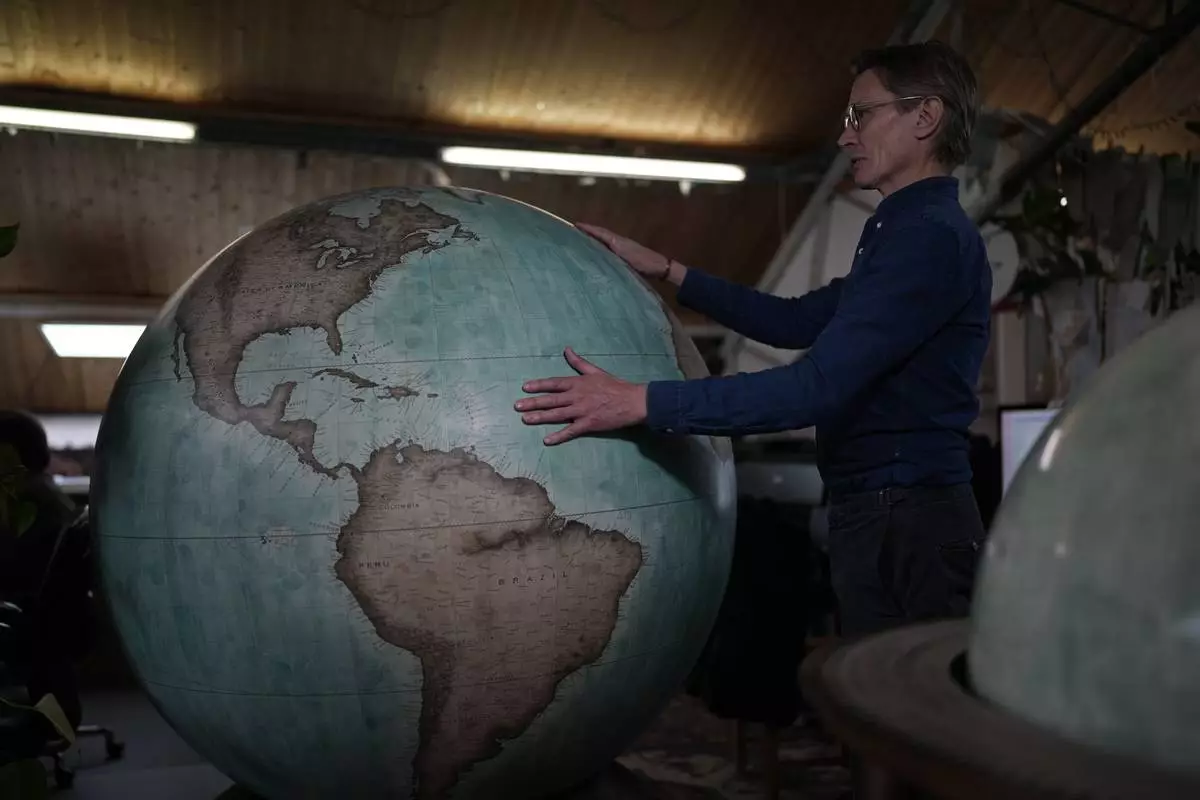
FILE - Peter Bellerby, the founder of Bellerby & Co. Globemakers, holds a globe at a studio in London, Tuesday, Feb. 27, 2024. (AP Photo/Kin Cheung, File)
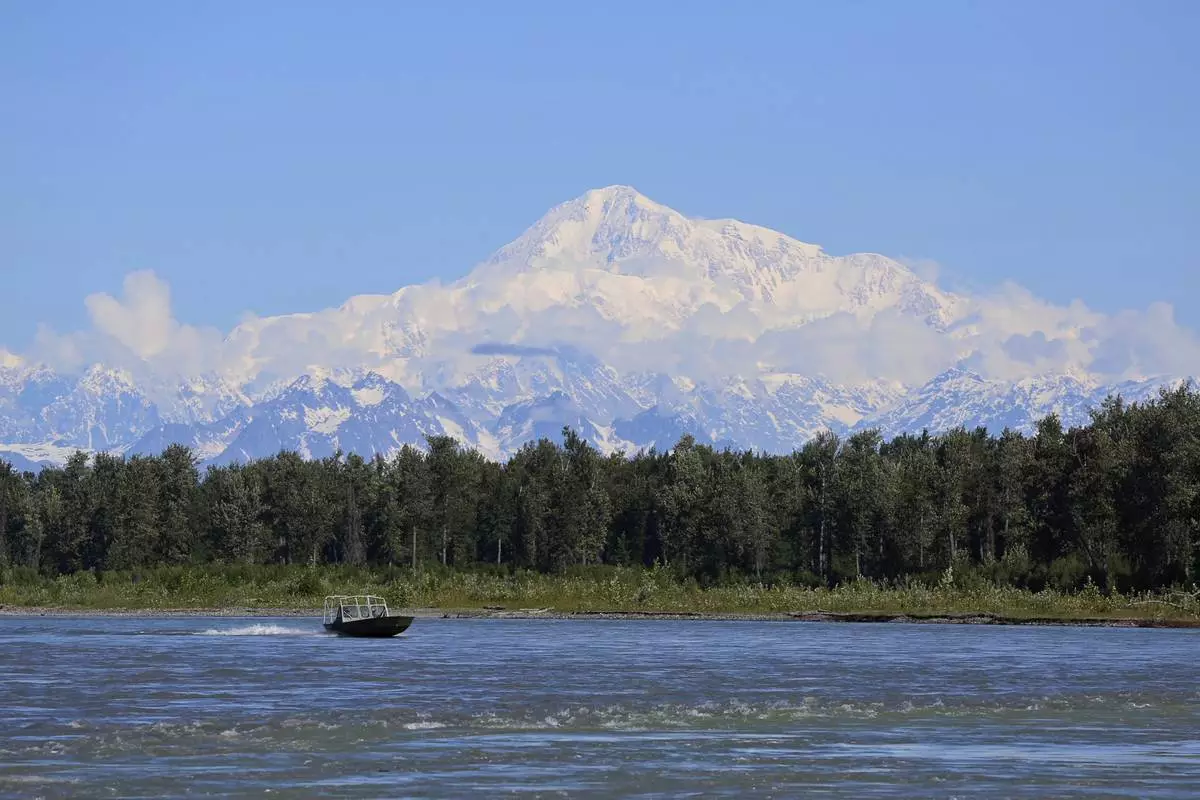
FILE - A boat is seen on the Susitna River near Talkeetna, Alaska, on Sunday, June 13, 2021, with Denali in the background. Denali, the tallest mountain on the North American continent, is located about 60 miles northwest of Talkeetna. (AP Photo/Mark Thiessen, File)
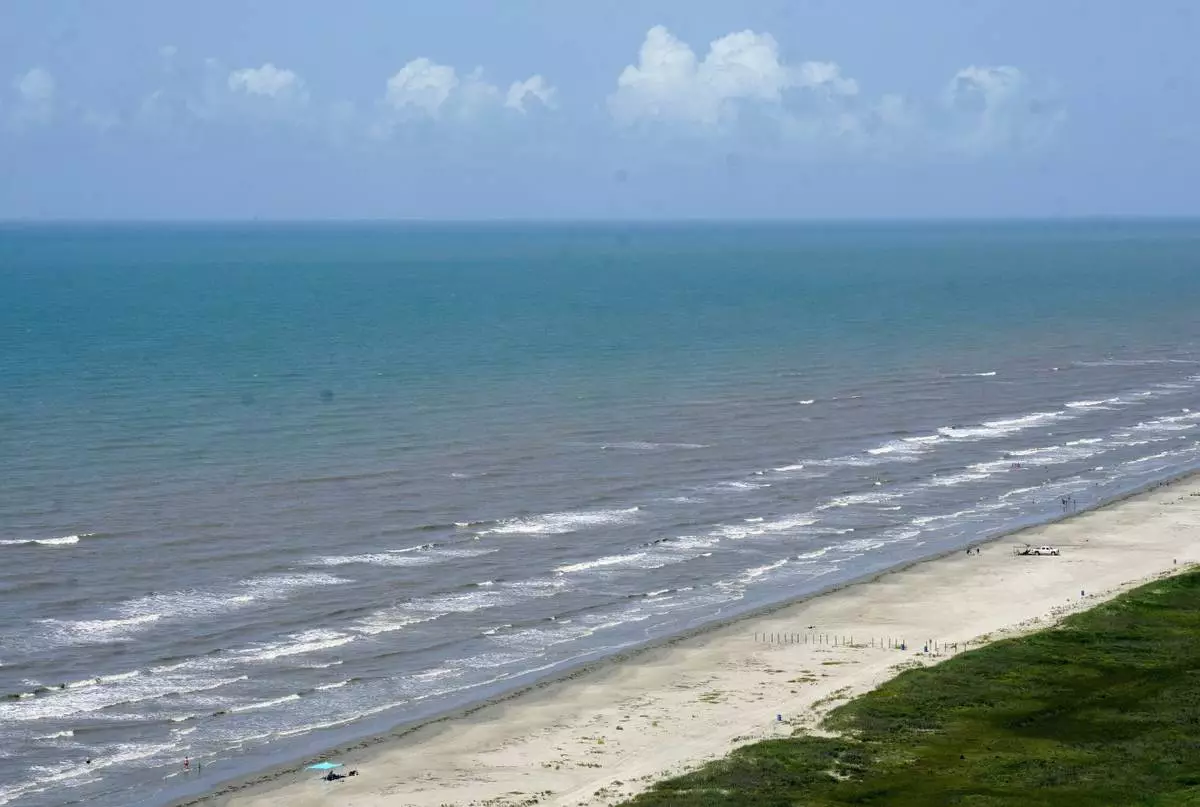
FILE - The water in the Gulf of Mexico appears bluer than usual off of East Beach, Saturday, June 24, 2023, in Galveston, Texas. (Jill Karnicki/Houston Chronicle via AP, File)
























